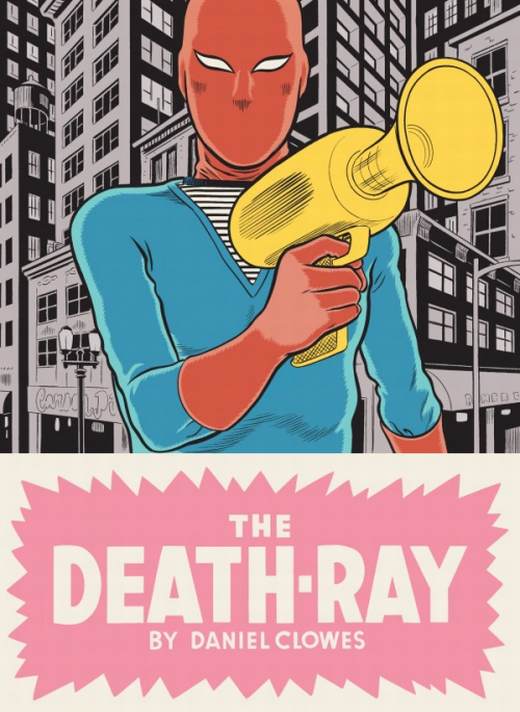A little bit back, Peter Sattler noted that Dan Clowes’ career in comics often seems like a long, bitter struggle against comics. As Peter says:
[Clowes’] work goes out of its way to thematize the artist’s and/or the story’s struggle against comics themselves – against a form that, as Clowes presents it, seems unable to encompass interior states, unable to escape its own theatricality and artificiality, unable to circumvent its own closed system of beginnings and endings, set-ups and punch-lines. Clowes dramatizes his contest with these limits, transforming that contest into the content of his graphic novels.
Peter talks about this mainly in terms of formal limits…but to me it seems like it’s a cultural issue as well. Comics seem unable to encompass interior states, and unable to move beyond largely bone-headed gags, because comics are for kids. As I discuss here, Clowes in comics like Velvet Glove and Wilson seems to compulsively assert his distance from a form, and from influences, which he views as both infantile and inescapable. Much of the adult/edgy content, misanthropy, and violence against women in his books comes across as a kind of desperate signaling that he is not (like say Charles Schulz) writing for children. His comics can be seen as a long insistence that he is too grown up — an insistence which is (as he is certainly aware) infantile. From this perspective, Enid’s obsession with older men is not (just) a kind of self-flattering, but is a displaced expression of Clowes’ own obsessions. He’s an older guy who is fascinated with the idea, and the impossibility, of being an older guy.
The Death Ray is pretty much in the same mold. It’s a super-hero parody whose protagonist, Andy, gains super-strength by smoking cigarettes — an obvious reference to wanting to look and be older. The rest of the story is built around exploring what super-hero stories would really be like, as Clowes, familiarly, uses the genre to underline his own adult distance from it. Andy wanders around looking for criminals to beat up, but nobody attacks him. He punishes people who don’t particularly deserve it at the behest of his best-friend, Louie, and then feels bad about it. As Aaron Leitko wrote at the Washington Post “The Death-Ray employs the core super-hero conventions — the origin story, the costume and the sidekick — in the most banal ways possible.” That banality (like the banality in Wilson, or in alt comics more generally) is the validating boredom; the sign that we are not children, but adults, who understand (to paraphrase Ambrose Bierce) that realism is the world as it is actually seen by toads.
So Clowes is doing his usual thing. But…his usual thing, in this context, isn’t nearly as irritating as it usually is. The main reason for that, I think, is that, in this case, Clowes’ agonized relationship with his material doesn’t come across as condescending or wearisomely anxious. It just comes across as another superhero comic. After all, the main reference here seems to be to the Lee/Ditko Spider-Man — and how different is Andy from Peter Parker, really? Not very. Like Andy, Peter is a nerdy, angry, unhappy, orphaned kid; like Andy, Peter uses his powers for self-aggrandizement; like Andy, Peter’s powers make things worse for him, not better; like Andy, Peter makes his own kind of doofy looking costume.
And, like Andy, Peter, and the comic he’s in, is obsessed with growing up. As Chris Gavaler pointed out here last week, the whole Spider-Man story is basically a metaphor for puberty, with radioactive spider bite standing in for surging hormones. Clowes changes the spider bite to a cigarette, which makes the metaphor more pointed, but it doesn’t really change it’s nature. The Death Ray, almost despite itself, is extending its source material — the anxiety and angst that Clowes’ taps is the same in essence as Lee/Ditko’s angst. That’s very different from Wilson, for example, where Charles Schulz’s whimsy and weird humor are replaced with jokes about shit and ass rape (and not with funny jokes about shit and ass rape, either.)
All of which perhaps helps to explain in part why parody has always been so central to the super-hero genre. From Plastic Man and Captain Marvel to Superduperman to the 60s Batman television show to the Watchmen, superhero parodies have always been both critically lauded and extremely popular. On the one hand, you could argue that this is because superheroes are really stupid, and no halfway intelligent creator is going to take them seriously. And I certainly think there’s a lot to that argument.
But Death Ray also suggests that parodies are the best superhero narratives not only because they undermine the stupidity of superhero narratives, but because they fulfill them. Superhero stories are, as everybody knows, adolescent power fantasies; they’re a way for children of all ages to pretend to have ascended to the prerogatives and super-strength of adulthood. And what is more adult than parodying the silly fantasies of youth? Clowes is (fairly amusingly) sneering at the stupid dreams of fanboys of all ages who want to be grown up — but he’s also providing those fanboys with the exact same dream. Andy takes a hit from his cigarette; Clowes’ readers take a hit of The Death Ray. It’s Clowes’ best comic because, almost despite himself, it’s the one in which he’s able to provide the genre pleasures that obsess him without compulsively assuring his readers and himself that he’s too good for them.

